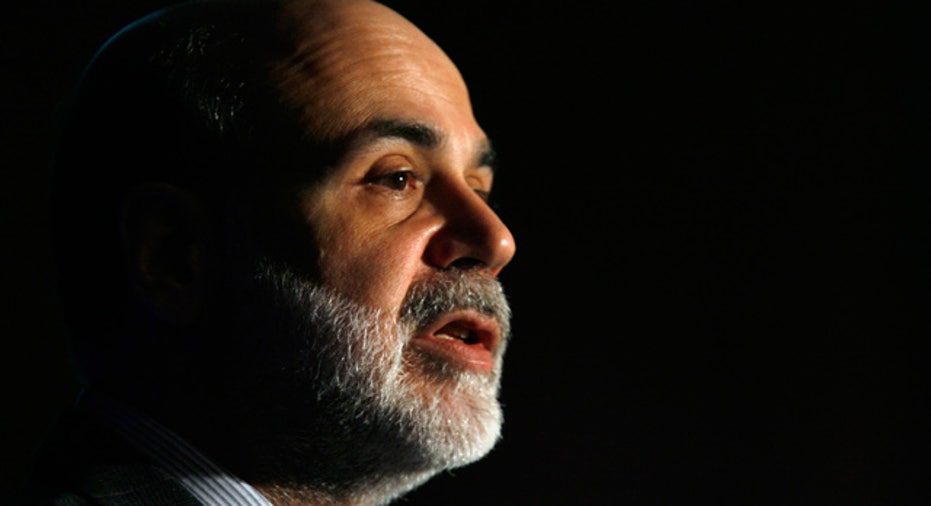Fed Likely to Close Out 2012 With More QE3

The Christmas trees are up. The Hanukkah menorahs are being lit. And New Year's is just around the corner. So, what are jolly ol' Chairman Ben Bernanke and his Federal Reserve policymaking elves bringing the economy in their last meeting of the year?
With the election out of the way and the jobs picture looking a bit rosier, the Federal Open Market Committee, or FOMC, is sunsetting one rate-reducing strategy and most likely expanding another. The group might also revisit how it offers interest rate guidance after several members grumbled over tying low rates to a date rather than an economic indicator.
What the committee may not harp on is the looming "fiscal cliff," that doomsday double whammy of automatic spending cuts and tax hikes at the start of 2013 if lawmakers can't cobble together a deficit-cutting budget in time. The meeting comes as the White House and Congress continue to feverishly negotiate a deal before the deadline.
"This meeting should go pretty much by the book," says Brian Rehling, chief fixed-income strategist at Wells Fargo Advisors. "I'm not expecting any surprises."
Goodbye, Operation Twist
The cutely named Operation Twist, where the Fed swaps out short-term Treasuries it holds for longer-termed ones to keep interest rates low, is set to expire at the end of this year. The strategy has helped mortgage rates carve out new lows this year and maintained low interest rates on a host of other consumer and business loans.
The FOMC most likely won't reinstate another Operation Twist, but rather expand its third round of quantitative easing, or QE3, it started in September. That's where the Fed prints more money to buy up more securities -- in this case, mortgage-backed securities -- to push rates lower. The question is: How much should the Fed buy to compensate for the expiration of Operation Twist?
"The Fed is buying about $45 billion in securities a month in Operation Twist, but quantitative easing is a more powerful tool," says Paul Edelstein, director of financial economics at IHS Global Insight. "So, if the Fed wants to keep at the current levels, they might decide to buy less than that a month."
Rather than buying Treasuries like it did with Operation Twist, the group may decide to buy more mortgage-backed securities in its QE3 expansion because some members think they have more of an effect on mortgage rates, Edelstein says.
"I'm not sure if that's the case," he says. Either way, the betting man is gambling on a QE3 expansion of some sort.
New and improved rate forecast
At the beginning of this year, the FOMC released a new guidance for the benchmark federal funds rate that affects interest rates on consumer and business loans. The group estimated that the key rate would need to remain near 0% -- where it is now -- through late 2014 to boost the economy. In September, the group extended that deadline to mid-2015.
But many FOMC members voiced their discomfort with tying the federal funds rate to a timeline, according to the minutes of the last meeting. Why not link the rate to an economic indicator, instead?
"They could focus on a specific economic goal, such as bringing down the unemployment rate to a certain level," says Bernard Baumohl, chief global economist at The Economic Outlook Group LLC. "I think that would be more useful than to say, 'Keep rates low until 2015.'"
It's possible that the FOMC will rejigger how it forecasts the federal funds rate and present the new method Wednesday. But the group may hold off until the March meeting, says Rehling.
"I think they're still trying to figure out the economic indicator and the number they want to use," he says. "I think they are moving in that direction, and Bernanke will talk about it at (Wednesday's) press conference."
What 'fiscal cliff'?
Some may wonder whether the chairman will address the so-called fiscal cliff, a term he coined himself, during the news conference. It could be his last chance before the Jan. 1 deadline when drastic tax increases and spending reductions automatically start.
Bernanke, along with other FOMC members, has stressed in recent testimony and speeches that this cliff could plunge the economy back into a recession, and there's nothing the Fed could do to prevent it. But he may decide to keep his comments muted as President Barack Obama and House Speaker John Boehner continue to work in private on an agreement to avoid the cliff.
"Will they say something at the height of negotiations?" asks Edelstein. "I would say, no, they won't get into it."
Copyright 2012, Bankrate Inc.



















